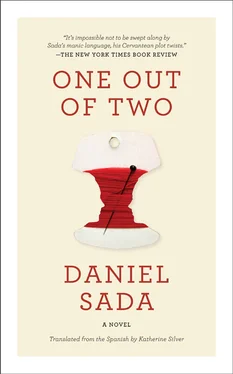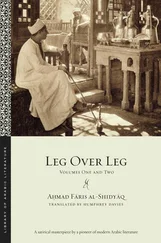“We have to write to our aunt.”
“You’re right, we should tell her where we’re living.”
Time passed: one day, under their front door: the twins found a large, lovely orange envelope. It was undoubtedly a letter from … They opened it and read: “You’re invited to the wedding of my son, Benigno; my boy is getting married. Both of you should come, we’re throwing a big shindig. I suggest you do your hair differently: for example, one could wear it down, and the other, piled on top of her head in a tower. And don’t dress the same, and don’t stick together the whole time. Take my advice. There’ll be many single men and you might just catch one. No matter what, I’m sending you my blessings, and remember, we always have a big bed for you in my house, because: things are better around here, not like before, now we even have enough money to travel. Anyway, it would be our pleasure to welcome you into our home again. Fondly, your aunt who misses you, Soledad Guadarrama.” The date of the wedding was written along the bottom of the blue card, especially for them … In four days’ time.
At this point — we should get our bearings — the Gamal sisters were rapidly approaching their forty-second birthday. Across their foreheads and under their eyes, down their necks and along their eyelids, clear ridges had appeared, as if some phantom fiend visited them at night and sculpted their slumbering countenances, and while they were at it, their bodies, with the clear intention of making them look more alike: making them one — poor things—: as if life were pure and vain idealism, for the number two can never be one. Whatever the case, and as for their sameness, we could wax eloquent, speak of dimensions and analogous depths, but …
Constitución and Gloria found in that invitation — by all measures, kind — the key to their perhaps most deeply buried preoccupation: “There’ll be many single men.” Such crass nonsense because: after reading this refrain, the twins saw each other and themselves differently, and from that moment on the ambiguous gift of looking so much alike began to make them uncomfortable. They could not both go to Nadadores.
No matter how badly they now wanted to look different, even with makeup, each on her own: without agreeing or intentionally seeking obvious contrasts: no: their identity was fixed, it was a curse and that was the end of it and nobody knows why. That is: in the past they’d tried: if one dolled herself up, the other wouldn’t; if one wore a dress, the other would put on trousers … But folks aren’t so easily fooled: even if they managed it in Sacramento or Cuatro Ciénegas, or even here, in Ocampo: they were recognized: on the bus, but more to the point: their luck in love was limited to much-too-furtive glances: from the absentminded. Which is precisely why they never went to dance parties: moreover, they were so unsightly that nobody ever chose them, not even the drunks. Hence, their path was narrow and grew ever narrower as the years went by … What horrors! a knife’s edge, a distant glint, and maybe unnecessary.
Then that wedding: an opportunity, an illusion, a short vacation, a break from the routine, even if this marvel of meticulousness was a source of pleasure. Which is why they didn’t have the slightest remorse about being slackers because from seven in the morning till seven at night — twelve full hours of toil, well, except an hour and a half to rest, figured into the schedule and offering concrete benefits, lest we think otherwise: the midday meal, washing up then lying down on different beds: sleeping soundly for fifteen or maybe ten minutes: power naps — every day except Sunday their customers arrived with their fabrics and left satisfied, their garments packed in bags with handles — paper bags — that the twins used because they happened to like them. Though lately, they had so many people traipsing through their door that they were falling behind, so rather than fail to fill orders as promised, they sewed till midnight almost every day. Hence, the stress previously mentioned.
Hence, also, the success — they worked for cheap — that allowed them to forget for long stretches their lack of acquiescence to love: men and their kisses, the sexual divide, those ecstatic shapes of bodies intertwined: over there, in the impossible beyond: tenderness was there, in the heavens.
That’s why this was so disruptive. The wedding. The separation. The attempt to find out if somehow: the gnosis of a miracle: a suitor might unexpectedly appear. But only one would go, because both, they couldn’t, no way. They discussed it extensively, the pros and the cons …
And they finally decide who would go to Nadadores with the flip of a coin. Heads or tails? Constitución won, and poor Gloria: she was left in a terrible predicament! She’d have to work double. One could even say, she’d have to work fast — chuck the usual perfectionism — if she was going to keep up with the orders. For her to fully embrace her defeat would require a change in criteria. To cleanse herself of envy so as to condescend, pretend to be someone who cared, though to tell the truth, deep down she bitterly wished that the other had been the one who’d lost, even if she was her equal. They still looked alike, but Gloria wanted to deny it when tails turned up and her ire rose.
“I hope you find someone good: a real man; but don’t get your hopes up too high.”
Wary dismay, and ultimately: razor-sharp envy; the loser issued her warning in tremulous tones and under the guise of great sincerity as she sewed without looking at her dear sister’s girlish delight, the perspicacious or deeply wise winner knowing how imprudent it would be to say anything that might provoke a silly spat, that it was advisable, for now, to accept the advice, pretending to repress her sense of triumph.
“You’re right, I shouldn’t get my hopes up too high.”
The talkative one, however, was a hypocrite, for she rose at dawn, in the dark and stealthily, not making any noise that would rouse she who remained unconscious. Complicated maneuvers to dress: then running euphorically the four blocks to the shop, after leaving on the bed a short note that read: “I’ll be at the shop. I’m going to make a dress out of our finest fabric, because I’m thrilled to be going to Nadadores. This is, after all, my big chance.” These lines, when read by the other, made her think that a fundamental attitudinal change had been wrought. What the devil had Constitución dreamed?
Erroneous notions. Getting all in a tizzy over a make-believe affection.
Now the gloating had come out in the open and was on the verge of flooding the scene or creating total disarray, as if the winning twin wished to provoke, or so the defeated sister saw it, heavy-duty envy or cold indifference or — why else? And that cursed coin toss now loomed large and powerful enough to destroy her twin. Imminent danger of … Gloria thought to herself: “I don’t like the look of things … I’m going to the shop. I’m going to set that girl straight.”
And off she went without even a bite of breakfast. Also running … There Constitución was, nose to grindstone, sewing her dress, her attention so rapt that she failed to notice the other’s noisy arrival, until that one said:
“I can’t envy you because what is yours is mine and vice versa. Isn’t that what we agreed years ago? What? Aren’t we exactly alike? I don’t understand why you came here so early, almost almost sneaking out. I didn’t care for your note. What’s wrong with you? Who do you think you are? What’s gotten into you?”
To which the other replied, “You’re right, I shouldn’t get my hopes up too high.”
“Don’t play that part with me. You’re all in a tizzy over something you have no idea about, and I don’t want you coming back sad if you don’t get what you want.”
Читать дальше












